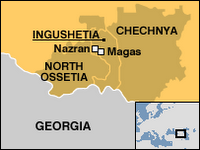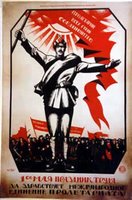Technates are Neo-Soviets!
 I resume my thankless efforts to find a geopolitical home for technate-advocate Skip Sievert. All paths continue to lead back to Putin's Neo-Soviets. That's not only post-communist Russia but its central Asian satellites.
I resume my thankless efforts to find a geopolitical home for technate-advocate Skip Sievert. All paths continue to lead back to Putin's Neo-Soviets. That's not only post-communist Russia but its central Asian satellites.I give you, Robert Bruce Ware, What Will Come of Anna Politkovskaya's Death? Or, at least an excerpt:
In the North Caucasus, it is no longer the time of the corrupt ex-Soviet elite, who governed many of the republics in the Yeltsin years. Nor is it any longer the day of their charismatic counterweights, such as Dzhokhar Dudaev and Shamil Basaev in Chechnya or Ruslan Aushev in Ingushetia. Rather, this is the dawn of the North Caucasian technocrats.
The emergent technocracy is illustrated nowhere better than in Chechnya's neighboring Republic of Dagestan, where Mukhu Aliev was appointed by Putin earlier this year to be the republic's first president. Though he served for more than a decade as chair of the local parliament, Aliev managed to avoid the factionalism and corruption that undermined Dagestan's nascent democracy. With a doctorate in philosophy and a three-room, Soviet-style apartment, he is seen by most Dagestanis as a principled manager attempting to build a meritocracy while undercutting local corruption.
 Maybe Skip's resistance has to do with Stalin's legacy? I was just sitting here wondering to myself, what if Trotsky had got into power? Would he have been able to modernise Russia, and concentrate on attaining internal Weberian bureaucratic ideals? Wouldn't have history would have turned out better? Techocracy would have survived in a better light?
Maybe Skip's resistance has to do with Stalin's legacy? I was just sitting here wondering to myself, what if Trotsky had got into power? Would he have been able to modernise Russia, and concentrate on attaining internal Weberian bureaucratic ideals? Wouldn't have history would have turned out better? Techocracy would have survived in a better light?As it is, the idea technocracy has survived only as a quaint obscurism. Look at to what lengths I have been driven to find references in the mainstream? Frankly, I am blue in the face and my patience is about to give out.
Updating:
In the North Caucasus, it is no longer the time of the corrupt ex-Soviet elite, who governed many of the republics in the Yeltsin era. Nor is it any longer the day of their charismatic counterweights, such as Dzhokhar Dudayev and Shamil Basayev in Chechnya or Ruslan Aushev in Ingushetia. Rather, this is the dawn of the North Caucasian technocrats.
The emergent technocracy is nowhere more evident than in Dagestan, where Mukhu Aliyev was appointed by Putin earlier this year to be the republic’s first president. Although he served for more than a decade as chair of the local parliament, Aliyev managed to avoid the factionalism and corruption that undermined Dagestan’s nascent democracy. He is seen by most Dagestanis as a principled manager, who is attempting to build a meritocracy while undercutting local corruption.
There are many comparisons between Aliyev in Dagestan, and ??imuraz ??msurov in North Ossetia. Much like Aliyev, Mamsurov was the speaker of the North Ossetian legislature, who was relatively free of political baggage. Already known for his decency, Mamsurov achieved overwhelming popularity when he declined to have his own two children released from the school in Beslan during the 2004 hostage crisis. How, he asked, would he then be able to look his neighbors in the eye? Less than a year later, Putin appointed him to lead the republic.
A few months after that, Putin appointed Arsen Kanokov to replace Valery Kokov as the head of Kabardino-Balkaria. During Kokov’s fifteen-year rule, the republic was mired in political corruption and economic stagnation. As a wealthy businessman, Kanokov resembles neither Aliyev nor Mamsurov, but he is a step up from his predecessor.
Back in Chechnya, the Kremlin anointed Alu Alkhanov as Chechnya’s president prior to the 2004 election that replaced his assassinated predecessor, Akhmed Kadyrov. A former policeman, Alkhanov is respected by most Chechens as a principled, if not particularly powerful, leader. Alkhanov lacks power vis a vis Kadyrov’s 30-year-old son, Ramzan, who serves as Chechnya’s loyalist premier and leads a militia of several thousand men. The rivalry between Alkhanov and Kazyrov illustrates two Weberian ideal types – “bureaucratic” versus “charismatic” authority.
Ramzan has had a role to play because Chechnya’s government is too weak to support Alkhanov’s bureaucratic approach. Through brute force, Ramzan gets things done, but Ramzan’s brutality was a regular target of Politkovskaya’s exposes.
Shortly after he rose to power in 2004, it was possible to view Ramzan as a necessary evil. Perhaps his brutality was the only realistic alternative to the brutality of Russian-Chechen warfare, on the one hand, and the brutality of Chechnya’s de facto independence on the other. But Politkovskaya never saw the necessity of Ramzan; she just saw the evil.
It is no longer possible to dismiss her point, given the Kremlin’s recent bureaucratic appointments in the region. If the Kremlin can support principled bureaucrats in Dagestan and North Ossetia, and something remotely along those lines in Kabardino-Balkaria, then why can’t it bolster Alkhanov in Chechnya and nudge Ramzan toward the sidelines? However slowly and painfully, Chechnya has stabilized in the past two years, and it will soon be ready for bureaucrats like Alkhanov.
Russian Profile


